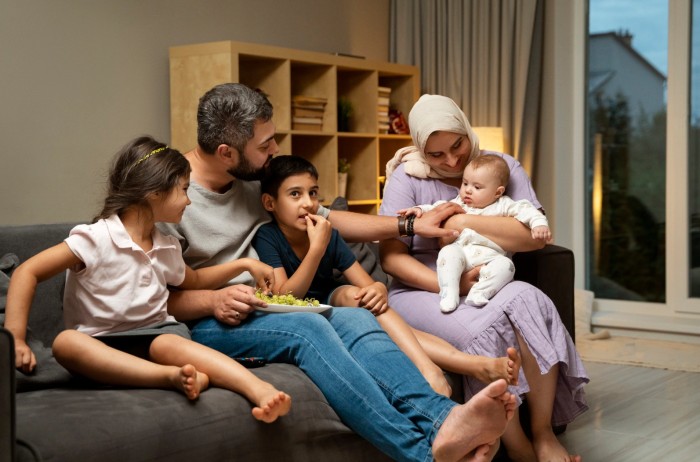IMANA NEWS
The Muslim Family and Its Role within Society
19 January 2023

As the world’s second-largest religious group and a significant community in the United States, learning Islamic views about family can help us understand and be more compassionate to one another.
The importance of family in Islam is a cornerstone of their values. People know their role, and extended families are necessary for the upbringing of healthy children.
More recently, traditional Muslim families are challenged by generational gaps and a growing trend towards nuclear families instead of extended ones. Based on traditional ideologies, assigning less importance to extended families leads to suffering and isolation. Meanwhile, the generational gap sees Muslims veering away from older generations as well as traditional customs and values.
Join us as we explore traditional concepts of family in Muslim culture and how they’re influenced by modern-day society.
Traditional Muslim Families
It is common for Muslim families to have large families that span up to three generations. This provides security and support, especially in times of uncertainty.
Respect is earned with age since experience and wisdom are attributed to more years spent living. Caring for your parents and the elderly in their later years is considered an opportunity from Allah.
The family is headed by patriarchs who strive to maintain ideal families. They spread their values not only within the family but to everyone who comes in contact with it. It is believed that a family that eats and prays together stays together. A patriarchal family head who does not carry out his duties can be prosecuted under the Shari’ah.
Muslim Family: Modern-day Challenges
Here are some of the challenges faced by modern Muslim families:
- As is common in many conservative traditional societies, the bride has to adopt the husband’s family as her own after marriage. Many modern-day families are nuclear ones and they only experience the customs of an extended family when they are sent to live with their in-laws.
- Despite religious teachings that say otherwise, there is a recent trend where people are marrying later in life. The reason this is discouraged in Islam is the belief that the ability to adjust lessens with age as individuals become more stable and set in their ways.
- Modern living in the West is repeatedly faced with lifestyle choices that are not aligned with traditional Muslim family values. This is more apparent among individuals who maintain nuclear families.
Despite these challenges, the family remains an important social structure for Muslims.
Gender Segregation and Healthcare
There is strong segregation between legitimate and illegitimate relationships in Islam. Premarital sex is strongly discouraged. Love and bonding are expected to develop after marriage.
Before the couple is married, the two families bond while physical contact between members of the opposite sex is frowned upon. This is the reason a lot of patients prefer doctors and clinicians of the same sex, especially in cases concerning gynecology.
Marital Customs, Gender Identity, and Modern Society
Islam has its share of controversial marital customs. While they may have been traditionally practiced, modern-day views are quickly making them outdated and minimizing the number of people who still engage in them. Here are a few examples:
Intermarriage Among Muslim Families
Intermarriage among Muslim families used to be prevalent. However, since it creates a smaller gene pool that is unhealthy from a medical standpoint, this isn’t practiced as much among modern Muslims.
Women’s practices
In some African countries with a vast Muslim population, female genital mutilation is an ongoing practice. Despite female genital mutilation’s frequent association with Islam, many Islamic organizations and individuals have spoken up and contested this popular assumption. According to one writer who spent several years in countries with large Muslim populations, “There are no instructions in the Holy Qur’an or in the traditions of the Holy Prophet (sa) that command Muslims to circumcise their daughters.”
Sex and Homosexuality
In Islam, sex between a married man and woman is regarded as an enjoyable activity that has the blessings of Allah. Homosexual interactions are discouraged.
While this is true throughout the world, it does not mean that Muslims discriminate against those who have made this choice. On the contrary, it is advised, on the part of the entire community, that all people, regardless of sex, creed, or gender, be treated with respect and love.
Conclusion
According to Allah SWT, we are to help one another so that we may receive infinite rewards in this life or the afterlife. This is why helping families in conflict and disaster-ridden areas like Pakistan, Jordan, and Gaza is an important initiative for IMANA.
The desire to help combined with knowing traditional and contemporary Islamic family values enable us to become more compassionate healthcare practitioners.
If you would like to be part of IMANA’s outreach efforts, you can visit the IMANA website, volunteer, and find other ways of supporting us.